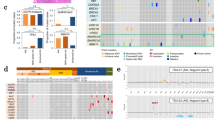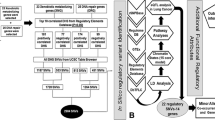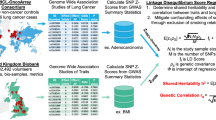Abstract
Human 8-oxoguanine DNA glycosylase 1 (hOGG1) has a major role in the repair of 8-hydroxyguanine, a major promutagenic DNA lesion. The genetic polymorphism rs1052133, which leads to substitution of the amino acid at codon 326 from Ser to Cys, shows functional differences, namely a decrease in enzyme activity in hOGG1-Cys326. Although several studies have investigated the association between rs1052133 and lung cancer susceptibility, the effect of this locus on lung cancer according to histology remains unclear. We therefore conducted a case–control study with 515 incident lung cancer cases and 1030 age- and sex-matched controls without cancer, and further conducted a meta-analysis. In overall analysis, the homozygous Cys/Cys genotype showed a significant association with lung cancer compared to Ser allele carrier status (odds ratio (OR)=1.31, 95% confidence interval (CI)=1.02–1.69). By histology-based analysis, the Cys/Cys genotype showed a significantly positive association with small-cell carcinoma (OR=2.40, 95% CI=1.32–4.49) and marginally significant association with adenocarcinoma (OR=1.32, 95% CI=0.98–1.77). A meta-analysis of previous and our present study revealed that this polymorphism is positively associated with adenocarcinoma, although suggestive associations were also found for squamous- and small-cell lung cancers. These results indicate that rs1052133 contributes to the risk of adenocarcinoma of lung.
Similar content being viewed by others
Log in or create a free account to read this content
Gain free access to this article, as well as selected content from this journal and more on nature.com
or
References
Hoeijmakers, J. H. Genome maintenance mechanisms for preventing cancer. Nature 411, 366–374 (2001).
Asami, S., Hirano, T., Yamaguchi, R., Tomioka, Y., Itoh, H. & Kasai, H. Increase of a type of oxidative DNA damage, 8-hydroxyguanine, and its repair activity in human leukocytes by cigarette smoking. Cancer Res. 56, 2546–2549 (1996).
Cheng, K. C., Cahill, D. S., Kasai, H., Nishimura, S. & Loeb, L. A. 8-Hydroxyguanine, an abundant form of oxidative DNA damage, causes G—T and A—C substitutions. J Biol. Chem. 267, 166–172 (1992).
Boiteux, S. & Radicella, J. P. The human OGG1 gene: structure, functions, and its implication in the process of carcinogenesis. Arch. Biochem. Biophys. 377, 1–8 (2000).
Kohno, T., Shinmura, K., Tosaka, M., Tani, M., Kim, S. R., Sugimura, H. et al. Genetic polymorphisms and alternative splicing of the hOGG1 gene, that is involved in the repair of 8-hydroxyguanine in damaged DNA. Oncogene 16, 3219–3225 (1998).
Weiss, J. M., Goode, E. L., Ladiges, W. C. & Ulrich, C. M. Polymorphic variation in hOGG1 and risk of cancer: a review of the functional and epidemiologic literature. Mol. Carcinog. 42, 127–141 (2005).
Sugimura, H., Kohno, T., Wakai, K., Nagura, K., Genka, K., Igarashi, H. et al. hOGG1 Ser326Cys polymorphism and lung cancer susceptibility. Cancer Epidemiol. Biomarkers Prev. 8, 669–674 (1999).
Wikman, H., Risch, A., Klimek, F., Schmezer, P., Spiegelhalder, B., Dienemann, H. et al. hOGG1 polymorphism and loss of heterozygosity (LOH): significance for lung cancer susceptibility in a Caucasian population. Int. J. Cancer 88, 932–937 (2000).
Ito, H., Hamajima, N., Takezaki, T., Matsuo, K., Tajima, K., Hatooka, S. et al. A limited association of OGG1 Ser326Cys polymorphism for adenocarcinoma of the lung. J. Epidemiol. 12, 258–265 (2002).
Le Marchand, L., Donlon, T., Lum-Jones, A., Seifried, A. & Wilkens, L. R. Association of the hOGG1 Ser326Cys polymorphism with lung cancer risk. Cancer Epidemiol. Biomarkers Prev. 11, 409–412 (2002).
Park, J., Chen, L., Tockman, M. S., Elahi, A. & Lazarus, P. The human 8-oxoguanine DNA N-glycosylase 1 (hOGG1) DNA repair enzyme and its association with lung cancer risk. Pharmacogenetics 14, 103–109 (2004).
Kohno, T., Kunitoh, H., Toyama, K., Yamamoto, S., Kuchiba, A., Saito, D. et al. Association of the OGG1-Ser326Cys polymorphism with lung adenocarcinoma risk. Cancer Sci. 97, 724–728 (2006).
Chang, J. S., Wrensch, M. R., Hansen, H. M., Sison, J. D., Aldrich, M. C., Quesenberry, C. P. Jr. et al. Base excision repair genes and risk of lung cancer among San Francisco Bay Area Latinos and African-Americans. Carcinogenesis 30, 78–87 (2009).
Sorensen, M., Raaschou-Nielsen, O., Hansen, R. D., Tjonneland, A., Overvad, K. & Vogel, U. Interactions between the OGG1 Ser326Cys polymorphism and intake of fruit and vegetables in relation to lung cancer. Free Radic. Res. 40, 885–891 (2006).
Li, H., Hao, X., Zhang, W., Wei, Q. & Chen, K. The hOGG1 Ser326Cys polymorphism and lung cancer risk: a meta-analysis. Cancer Epidemiol. Biomarkers Prev. 17, 1739–1745 (2008).
Hung, R. J., Christiani, D. C., Risch, A., Popanda, O., Haugen, A., Zienolddiny, S. et al. International Lung Cancer Consortium: pooled analysis of sequence variants in DNA repair and cell cycle pathways. Cancer Epidemiol. Biomarkers Prev. 17, 3081–3089 (2008).
Hung, R. J., Brennan, P., Canzian, F., Szeszenia-Dabrowska, N., Zaridze, D., Lissowska, J. et al. Large-scale investigation of base excision repair genetic polymorphisms and lung cancer risk in a multicenter study. J. Natl. Cancer Inst. 97, 567–576 (2005).
Tajima, K., Hirose, K., Inoue, M., Takezaki, T., Hamajima, N. & Kuroishi, T. A model of practical cancer prevention for out-patients visiting a hospital: the Hospital-based Epidemiologic Research Program at Aichi Cancer Center (HERPACC). Asian Pac. J. Cancer Prev. 1, 35–47 (2000).
Hamajima, N., Matsuo, K., Saito, T., Hirose, K., Inoue, M., Takezaki, T. et al. Gene–environment interactions and polymorphism studies of cancer risk in the Hospital-based Epidemiologic Research Program at Aichi Cancer Center II (HERPACC-II). Asian Pac. J. Cancer Prev. 2, 99–107 (2001).
Suzuki, T., Matsuo, K., Hiraki, A., Saito, T., Sato, S., Yatabe, Y. et al. Impact of one-carbon metabolism-related gene polymorphisms on risk of lung cancer in Japan: a case control study. Carcinogenesis 28, 1718–1725 (2007).
Livak, K. J. Allelic discrimination using fluorogenic probes and the 5′ nuclease assay. Genet. Anal. 14, 143–149 (1999).
Tokudome, S., Ikeda, M., Tokudome, Y., Imaeda, N., Kitagawa, I. & Fujiwara, N. Development of data-based semi-quantitative food frequency questionnaire for dietary studies in middle-aged Japanese. Jpn. J. Clin. Oncol. 28, 679–687 (1998).
Ma, J., Stampfer, M. J., Giovannucci, E., Artigas, C., Hunter, D. J., Fuchs, C. et al. Methylenetetrahydrofolate reductase polymorphism, dietary interactions, and risk of colorectal cancer. Cancer Res. 57, 1098–1102 (1997).
Tokudome, Y., Goto, C., Imaeda, N., Hasegawa, T., Kato, R., Hirose, K. et al. Relative validity of a short food frequency questionnaire for assessing nutrient intake versus three-day weighed diet records in middle-aged Japanese. J. Epidemiol. 15, 135–145 (2005).
DerSimonian, R. & Laird, N. Meta-analysis in clinical trials. Control. Clin. Trials 7, 177–188 (1986).
Higgins, J. P., Thompson, S. G., Deeks, J. J. & Altman, D. G. Measuring inconsistency in meta-analyses. BMJ 327, 557–560 (2003).
Harris, R. J., Bradburn, M. J., Deeks, J., Harbord, R., Altman, D. G. & Sterne, J. A. C. Metan: fixed- and random-effects meta-analysis. Stata J. 8, 3–28 (2008).
Lubin, J. H. & Caporaso, N. E. Cigarette smoking and lung cancer: modeling total exposure and intensity. Cancer Epidemiol. Biomarkers Prev. 15, 517–523 (2006).
Matsuo, K., Ito, H., Yatabe, Y., Hiraki, A., Hirose, K., Wakai, K. et al. Risk factors differ for non-small-cell lung cancers with and without EGFR mutation: assessment of smoking and sex by a case–control study in Japanese. Cancer Sci. 98, 96–101 (2007).
Inoue, M., Tajima, K., Hirose, K., Hamajima, N., Takezaki, T., Kuroishi, T. et al. Epidemiological features of first-visit outpatients in Japan: comparison with general population and variation by sex, age, and season. J. Clin. Epidemiol. 50, 69–77 (1997).
International HapMap Consortium. A haplotype map of the human genome. Nature 437, 1299–1320 (2005).
Acknowledgements
We thank doctors, nurses, technical staff and hospital administration staff at ACCH for the daily administration of the Hospital-based Epidemiologic Research Program at Aichi Cancer Center study. This study was supported by Grants-in-Aid for Scientific Research from the Ministry of Education, Science, Sports, Culture and Technology of Japan, for Cancer Research from the Ministry of Health, Labour and Welfare of Japan, and for the Third Term Comprehensive 10-year Strategy for Cancer Control from the Ministry of Health, Labour and Welfare of Japan.
Author information
Authors and Affiliations
Corresponding author
Rights and permissions
About this article
Cite this article
Okasaka, T., Matsuo, K., Suzuki, T. et al. hOGG1 Ser326Cys polymorphism and risk of lung cancer by histological type. J Hum Genet 54, 739–745 (2009). https://doi.org/10.1038/jhg.2009.108
Received:
Revised:
Accepted:
Published:
Issue date:
DOI: https://doi.org/10.1038/jhg.2009.108
Keywords
This article is cited by
-
The DNA Repair Protein OGG1 Protects Against Obesity by Altering Mitochondrial Energetics in White Adipose Tissue
Scientific Reports (2018)
-
A systematic review and meta-analysis of the association between OGG1 Ser326Cys polymorphism and cancers
Medical Oncology (2015)
-
Association between OGG1 Ser326Cys and APEX1 Asp148Glu polymorphisms and breast cancer risk: a meta-analysis
Diagnostic Pathology (2014)
-
hOGG1 Ser326Cys polymorphism and lung cancer susceptibility: a meta-analysis
Molecular Biology Reports (2014)
-
Smoking and hOGG1 Ser326Cys polymorphism contribute to lung cancer risk: evidence from a meta-analysis
Tumor Biology (2014)



